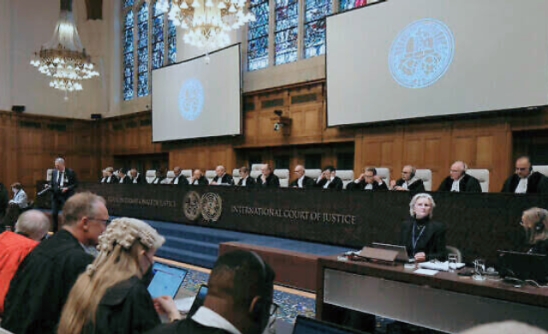The International Court of Justice (ICJ) in The Hague has commenced historic hearings on Monday to establish legal guidelines for combating climate change.
The unprecedented proceedings aimed to define the responsibilities of nations in protecting the planet and assisting vulnerable countries in mitigating the devastating effects of global warming.
Representatives from Vanuatu and other at-risk Pacific Island nations opened the hearings at the Peace Palace at 10:00am (0900 GMT), addressing a 15-member panel of Justices. Over the next two weeks, more than 100 countries and 12 organisations will make submissions, marking the highest participation ever at the ICJ.
Activists were optimistic that the court’s advisory opinion could have profound legal implications for global climate action. However, skeptics warned that the non-binding nature of the opinion and the potential delay—months or even years—before its delivery may limit its impact.
The hearings followed the conclusion of the COP29 climate summit in Azerbaijan, where wealthy nations agreed to mobilise $300 billion annually by 2035 to aid developing countries in transitioning to cleaner energy and preparing for climate impacts. Despite this commitment, the final deal was criticised for failing to include a global pledge to phase out fossil fuels.
“We are on the frontline of climate change impact,” said Ralph Regenvanu, special envoy for Vanuatu, which spearheaded the ICJ initiative with other Pacific island nations. “Our call for an advisory opinion from the ICJ on climate change is at a pivotal moment… one that sets clear the international legal obligations for climate action.”
The UN General Assembly referred two critical questions to the ICJ last year,”What obligations do states have under international law to protect the Earth’s climate system from greenhouse gas emissions and What are the legal consequences of these obligations for states that have caused significant harm to the climate system?”
The questions also addressed the responsibilities of nations toward vulnerable countries and communities suffering from rising sea levels and extreme weather events.
Joie Chowdhury, a senior lawyer at the Center for International Environmental Law, explained that the ICJ’s opinion is unlikely to provide detailed answers but will instead offer “a legal blueprint… on which more specific questions can be decided.” She anticipates the court’s opinion to be delivered next year, shaping climate litigation at domestic and international levels.
Major emitters like China, the United States, and India were among the nations expected to present submissions. This came amid alarming data from the Global Carbon Project, which revealed that carbon dioxide emissions from fossil fuels reached a record high this year, putting the world further off track to meet the 1.5°C global warming target established in the 2015 Paris Agreement.





